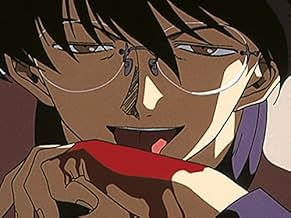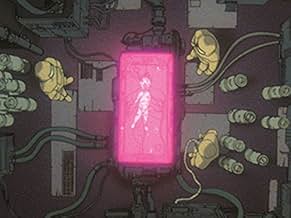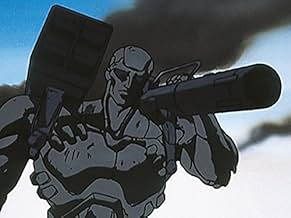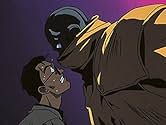Ajouter une intrigue dans votre langueIn this genre-defying cult classic, a humanoid robot girl sets out on a quest to make 30,000 friends in order to become fully human. What better way to gain the love of thousands than by bec... Tout lireIn this genre-defying cult classic, a humanoid robot girl sets out on a quest to make 30,000 friends in order to become fully human. What better way to gain the love of thousands than by becoming a pop idol?In this genre-defying cult classic, a humanoid robot girl sets out on a quest to make 30,000 friends in order to become fully human. What better way to gain the love of thousands than by becoming a pop idol?
Parcourir les épisodes
Avis à la une
Key the Metal Idol is not a typical robot-girl animé series, but a thoroughly engrossing story inspired by Pinocchio that explores human fragility, the pressures of fame, and hidden corporate agendas.
After you watch the first few episodes, it leaves you wanting to see it through to the end. The story may confuse you at first, but towards the end the plot twists eventually fall into place. However, there is a loose end or two, namely the relationship between Key and Sakura.
The dubbed version is done reasonably well, particularly the songs. In summary, Key the Metal Idol is animé for the non-animé viewer.
After you watch the first few episodes, it leaves you wanting to see it through to the end. The story may confuse you at first, but towards the end the plot twists eventually fall into place. However, there is a loose end or two, namely the relationship between Key and Sakura.
The dubbed version is done reasonably well, particularly the songs. In summary, Key the Metal Idol is animé for the non-animé viewer.
Key is easily one of my favorite anime series. Although it follows the anime style, it is quite unconventional for an anime. After watching the first couple tapes of this series, I had no idea what genre it was; it obviously has sci-fi elements, some action scenes (thought not many) and it is full of dramatic elements and that dark, melancholy mood that Key does so well. There are so many reasons to watch this series: incredible character design, quality animation and great cinematography, and most of all a plot that forces you to watch the series to its very end. If you have only seen the first few episodes or haven't seen this series at all yet, watch the whole thing!! This is a very unique series that everyone should check out. 9/10
The Pinocchio-esque Key, an android whose creator has been murdered, leaves her idyllic small town to travel to the big city in order to discover her purpose, despite having been raised in isolation and thus having never acquired a normal set of social or emotional responses, let alone anything like urban survival skills. Her responses to what happens to her in the saga of misadventures and heartbreaks that follow are uniquely innocent verging on messianic, in this beautifully drawn, sadly compelling, very unusual anime series.
After so many soulless fighting giant robot adventures, it is refreshing to watch a series which makes a technological creation so intimate and heartfelt and which focuses on personal existential growth rather than just using cutting edge robot technology to bash stuff.
Highly recommended, especially in its original Japanese.
After so many soulless fighting giant robot adventures, it is refreshing to watch a series which makes a technological creation so intimate and heartfelt and which focuses on personal existential growth rather than just using cutting edge robot technology to bash stuff.
Highly recommended, especially in its original Japanese.
About 3-4 years ago, I've fallen for a new genre of cartoons, the anime, it automatically caught my eye. 2 years ago I stumbled upon this series, only 3rd eppy was in, so I rented to see how it was, it was the cover that really made me want to see it, the second the credits started rolling, I was in love with this series. They used the old story of Pinocchio as the plot; they succeeded greatly in the remake of the old fairy tale. The beautiful character design, the amazing art, the deep plot that makes you beg for more, and the mystery so deep you will have to watch it again and again to understand it. This kind of quality I have never seen in anime, it's truly magnificent. It has nudity in about every episode, some violence, and blood, it's not all too bad though, and a 10y/o could watch it. It is a must see series, regardless of age, and the fact that it's an anime (and I know how many Americans hate anime, think it's stupid, and pointless). I strongly recommend this series to all. 13.5 stars out of 10 :p
Key The Metal Idol is something of a diverse anime show. I first saw an ad for it on another video a few years back, where the premise of the show was described: Key's a robot who needs to find 30,000 friends to make her become human. I saw it again later in a local rental store and decided to give it a shot.
At first glance, that's pretty much it: Key's robot-like behaviour is pretty standard at first - she speaks mostly in monotone and rarely uses First Person pronouns. Oddly enough on her trip to Tokyo (Key lived in a small village when her "grandfather," her guardian and alleged creator lived before he gave his dying instructions to Key for her to become human) she runs into her old friend Sakura - a friend from when she was in Junior High. Sakura takes her in, but is very skeptical about her mission to become human. Sakura also has a male friend named Tataki, but they are only friends - even if Sakura has an obvious thing for him. Tataki is the head of the fan club for Miho, the current top idol singer (an idol singer seems to be the Japanese counterpart to the flash-in-the-pan singers like NSYNC or Britney Spears in the US). Key is facinated with Miho, and realizes that Miho must have at least 30,000 friends, so her desire is to become an Idol Singer like Miho. Tataki is a kind person and takes an interest (friend only) in Key, enough to want to solve some of the mysteries around her.
But, like in almost all anime and most good dramas, things are not what they seem. The chief bad guys, Ajo and "D" want to capture Key because they believe her to be source of a power box that would allow their robots (called PPORs or Sipes in the show) vast strength. They seem to have a tie to Key's grandfather, her hometown, and even the Idol singer Miho. Even more bizaare, when these PPORs get around Key, they have a habit of blowing up. Key has something of a bodyguard, a man named Wakagi, who was her grandfather's assistant. He is mysterious and usually arrives just in time to help Key when she is in trouble. On top of this, Key already seems to be making a transformation. When in intensely emotional situtations, Key's robot-like voice and appearance are changed to that of an emotional, powerful girl who seems to have superpowers that disappear as soon as they happen - and then she passes out and wakes up with no memory of these moments -- back in her robot mode.
With all that I've written, I've still only scratched the surface of this complex show. The series is 13 30-minutes shows, along with two 90-minute rap-up shows. By far the most interesting character is Key. Her appearance is that of an thin, almost aneroxic teen (very non stereotypical anime) who has odd personality ticks and habits that annoy Sakura and interest Tataki. Her brief moments of her humanity beginging to take form are the highlight of the show, and are demonstrated in their 4th episode - one of the best of the series. She is almost contrasted with her friend Sakura, who I found to be somewhat irritating. Sakura almost doesn't fit in on the show: she looks like a stereotype of every anime teen-girl. She's somewhat annoying with her outbursts at Key and impatience with Tataki. But, she holds a key to Key's past.
Some fans have been very upset at the last two episodes, nearly 3 hours worth of material. The first long episode (13) is comprised of nearly all backstory, almost all of it given to us by conversations and grumblings of former friends of Key's Grandfather and Ajo. Wakagi and Tataki sit in a park and talk about Key's family for almost half the time. This in and of itself is not terrible, but there's very little to break up the time, so the show drags a bit here. The final show, without giving much away, is a bit better, but feels like it could have been about 10 minutes longer to give us some sense of closure with these characters. The feel of the final two shows are different as well, it's hard to describe except to say that it almost feels like a different set of writers finished it.
But that alone shouldn't detract people from seeing it. It's a good show that is very addicting. It feels like a PG-13, and maybe even R. There's a bit of nudity (most of it from the Robots Ajo creates and has a very disturbing relationship with, plus the standard fan-service Sakura shower scenes as well as a trip to an X-rated movie producer -- all of it getting a bit tiring after awhile), language, and a few rather violent scenes.
At first glance, that's pretty much it: Key's robot-like behaviour is pretty standard at first - she speaks mostly in monotone and rarely uses First Person pronouns. Oddly enough on her trip to Tokyo (Key lived in a small village when her "grandfather," her guardian and alleged creator lived before he gave his dying instructions to Key for her to become human) she runs into her old friend Sakura - a friend from when she was in Junior High. Sakura takes her in, but is very skeptical about her mission to become human. Sakura also has a male friend named Tataki, but they are only friends - even if Sakura has an obvious thing for him. Tataki is the head of the fan club for Miho, the current top idol singer (an idol singer seems to be the Japanese counterpart to the flash-in-the-pan singers like NSYNC or Britney Spears in the US). Key is facinated with Miho, and realizes that Miho must have at least 30,000 friends, so her desire is to become an Idol Singer like Miho. Tataki is a kind person and takes an interest (friend only) in Key, enough to want to solve some of the mysteries around her.
But, like in almost all anime and most good dramas, things are not what they seem. The chief bad guys, Ajo and "D" want to capture Key because they believe her to be source of a power box that would allow their robots (called PPORs or Sipes in the show) vast strength. They seem to have a tie to Key's grandfather, her hometown, and even the Idol singer Miho. Even more bizaare, when these PPORs get around Key, they have a habit of blowing up. Key has something of a bodyguard, a man named Wakagi, who was her grandfather's assistant. He is mysterious and usually arrives just in time to help Key when she is in trouble. On top of this, Key already seems to be making a transformation. When in intensely emotional situtations, Key's robot-like voice and appearance are changed to that of an emotional, powerful girl who seems to have superpowers that disappear as soon as they happen - and then she passes out and wakes up with no memory of these moments -- back in her robot mode.
With all that I've written, I've still only scratched the surface of this complex show. The series is 13 30-minutes shows, along with two 90-minute rap-up shows. By far the most interesting character is Key. Her appearance is that of an thin, almost aneroxic teen (very non stereotypical anime) who has odd personality ticks and habits that annoy Sakura and interest Tataki. Her brief moments of her humanity beginging to take form are the highlight of the show, and are demonstrated in their 4th episode - one of the best of the series. She is almost contrasted with her friend Sakura, who I found to be somewhat irritating. Sakura almost doesn't fit in on the show: she looks like a stereotype of every anime teen-girl. She's somewhat annoying with her outbursts at Key and impatience with Tataki. But, she holds a key to Key's past.
Some fans have been very upset at the last two episodes, nearly 3 hours worth of material. The first long episode (13) is comprised of nearly all backstory, almost all of it given to us by conversations and grumblings of former friends of Key's Grandfather and Ajo. Wakagi and Tataki sit in a park and talk about Key's family for almost half the time. This in and of itself is not terrible, but there's very little to break up the time, so the show drags a bit here. The final show, without giving much away, is a bit better, but feels like it could have been about 10 minutes longer to give us some sense of closure with these characters. The feel of the final two shows are different as well, it's hard to describe except to say that it almost feels like a different set of writers finished it.
But that alone shouldn't detract people from seeing it. It's a good show that is very addicting. It feels like a PG-13, and maybe even R. There's a bit of nudity (most of it from the Robots Ajo creates and has a very disturbing relationship with, plus the standard fan-service Sakura shower scenes as well as a trip to an X-rated movie producer -- all of it getting a bit tiring after awhile), language, and a few rather violent scenes.
Le saviez-vous
- AnecdotesThe two last episodes have a duration of ~98 minutes.
- Crédits fousAfter the credits, there is a short scene that takes place in a hospital.
- ConnexionsReferenced in A.I. Intelligence artificielle (2001)
Meilleurs choix
Connectez-vous pour évaluer et suivre la liste de favoris afin de recevoir des recommandations personnalisées
Détails
- Durée34 minutes
- Couleur
- Rapport de forme
- 1.33 : 1
Contribuer à cette page
Suggérer une modification ou ajouter du contenu manquant































